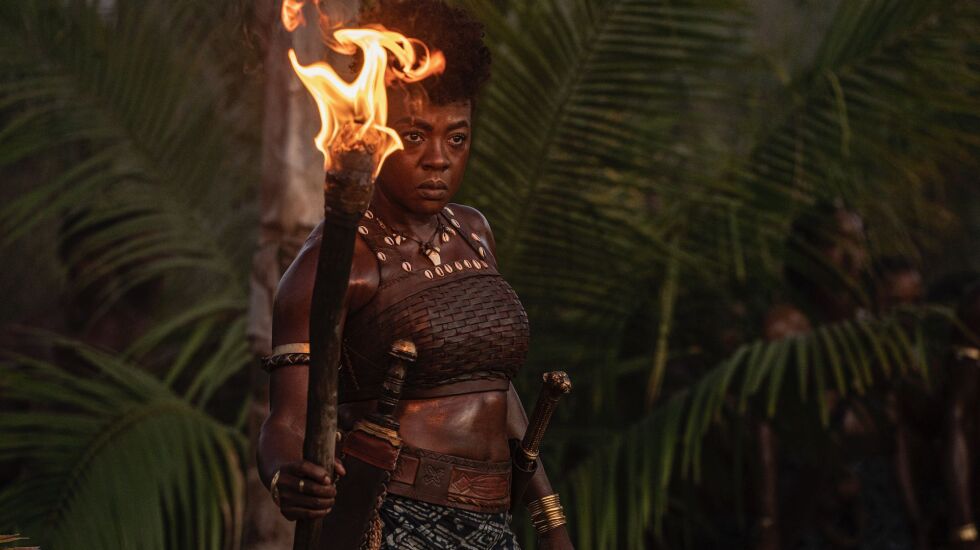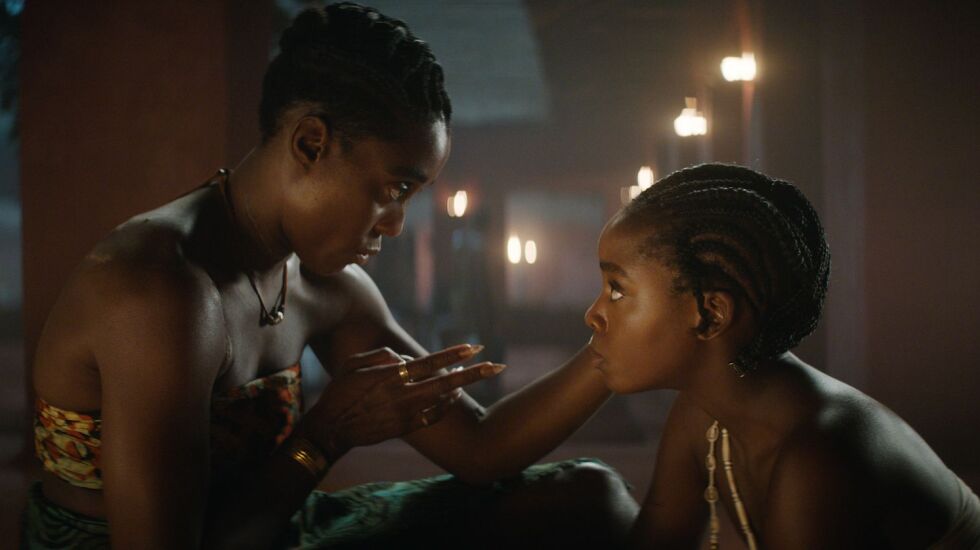
Director Gina Prince-Bythewood’s stirring and sprawling period-piece epic “The Woman King” is groundbreaking in that it tells the story of the legendary, real-life, all-female West African warrior unit known as the Agojie, but also quite traditional in that it follows the blueprint of blockbuster action sagas such as “Braveheart,” “Gladiator” and “Rob Roy.” Scene after scene, dramatic twist after dramatic twist, flashback after flashback, “The Woman King” takes a very familiar path — and yet there is one monumentally important difference here, and that of course is the presence of Viola Davis in the lead and a supporting cast consisting mostly of Black actors.
We’ve long known Davis can handle any type of part imaginable, and you can add the role of Badass Warrior General to the resumé. From the moment Davis’ Gen. Nanisca steps out of the shadows and into the night — her body marked by scars, her hair curled into a semi-Mohawk — as she twirls a formidable scimitar and leads her soldiers into a battle against a nearby tribe that has kidnapped and enslaved dozens of locals, we have zero doubt of her ferocity, her determination and her willingness to do whatever it takes in the name of victory. Nanisca is practically a god in the eyes of her troops and the people of the village, and rightfully so.
Filmed in South Africa and brimming with lush scenery, impressively staged production design and intricately beautiful costumes, hair and makeup, “The Woman King” is set in the West Africa of the 1820s. The all-female Royal Guard protects the vibrant and thriving kingdom of Dahomey, where the politically pragmatic King Ghezo (John Boyega) wisely keeps Nanisca close as a trusted advisor. Ghezo has the best interests of the people at heart — even if that means paying annual “tributes” of goods and some of his own people to the powerful and ruthless warlord Oda (Jimmy Odukoya) of the Oyo Empire (who has a past with Nanisca that has her determined to one day put his head on a stake), who does business with the Portuguese slave traders who sail to the continent periodically to take what isn’t theirs.
After the initial action sequence, “The Woman King” spends considerable time within the walls of the royal palace and the training grounds for a new group of Royal Guard recruits, and though Davis’ presence looms large even when she’s offscreen, the point of view often shifts to Thuso Mbedu’s Nawi, a naïve teenager with a rebellious streak whose father literally gave her away after she refused to be wed to a cruel and much older man. With Nanisca’s loyal right-hand Izogie (Lashana Lynch, doing memorable work) becoming a mentor to Nawi, we get a series of rough-and-tumble training sequences straight out of “An Officer and a Gentleman,” complete with a moment when Nawi goes back to help a struggling recruit who isn’t likely to make it through an obstacle course on her own.

Even when an outside mission leads to Nawi performing heroics that save Nanisca’s life, the wise but battle-weary and unforgiving general berates the girl for not sticking to the plan and for putting her own interests above those of the team. Why, it’s almost as Nanisca sees her younger self in Nawi.
“The Woman King” also veers into pure soap opera territory with the arrival of the Portuguese slave trader Malik (Jordan Bolger), who is incredibly naïve about the realities of buying, imprisoning and enslaving human beings and is conflicted because his father was white, but his mother was Dahomey. Malik has the ripped abs of a 21st century fitness model and whips his hair around like a 19th century Fabio as he instantly falls for Nawi, and that’s complicated because the Agojie must take a vow of celibacy and never have children. There’s also a dramatic development fairly late in the story that defies credulity, but we’re willing to go with it because by this time, we’ve become deeply invested in these strong, loyal and inspirational characters.
Working from a screenplay by Dana Stevens (based on a story by Stevens and the actor Maria Bello, who championed this project for years), director Prince-Bythewood has a fine eye for intimate dramatic scenes as well as the battle sequences, which follow the time-tested pattern of giving us quick-cut shots of dozens of warriors slicing and dicing one another up (albeit in PG-13 fashion), and then following the main rivals — in this case, Nanisca and the evil warlord Oda — who always manage to find one another amid the dust and blood and chaos, so they can square off for one prolonged and exciting fight to the finish.
There’s also time for a few moments of much-needed comic relief, mostly involving the king’s head spouse (Jayme Lawson), a scheming, pampered diva who mistrusts Nanisca and comports herself like a Real Housewife of Dahomey. John Boyega is fantastically entertaining as the King, who measures every decision carefully but is smart enough to realize Gen. Nanisca is his greatest strength, and Thuso Mbedu, while awfully slight to be such a fighting force, is brilliant and captivating as the independent-minded Nawi. Mostly, though, this film belongs to Viola Davis, and to the surprise of no one, she crushes it.







